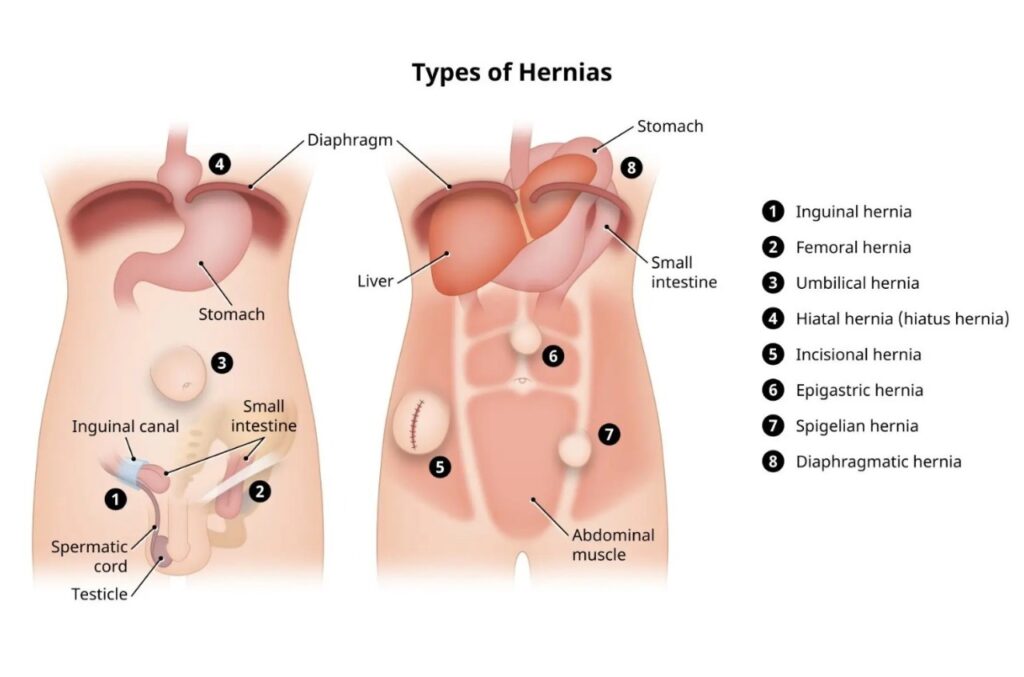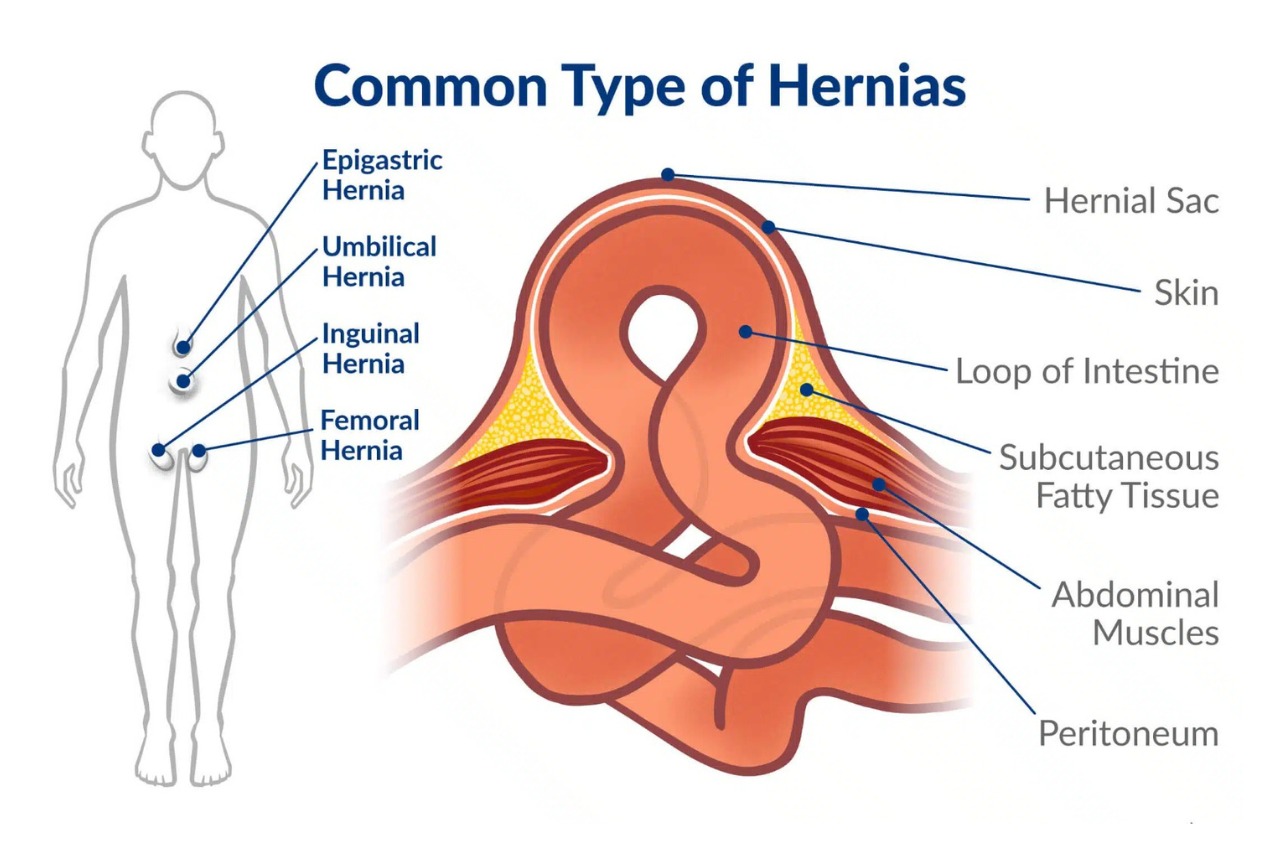A common medical problem that is frequently underestimated and misunderstood is hernias. Ignoring the signs can have major health consequences, even if they may initially seem innocuous. Effectively treating a hernia and preventing emergencies can be greatly impacted by knowing when to consult a physician. The signs, dangers, and when to get expert treatment will all be covered in this blog.
What is a Hernia?
When an internal organ or tissue pushes through a weak area in the surrounding connective tissue or muscle, it can cause a hernia. Although the majority of hernias occur in the abdomen, they can also develop in the groin, upper thigh, or belly button. Hiatal (upper stomach), umbilical (navel), inguinal (groin), and incisional (through a surgical scar) hernias are common varieties.
Some hernias can get worse over time, but others are painless and may not be dangerous right away. Knowing when to see a doctor for hernia is so essential to ensuring prompt diagnosis and treatment.
Signs and Symptoms That Shouldn’t Be Ignored
The first step in determining when to see a doctor for hernia is recognizing the symptoms. Here are some common indicators:
- A visible lump or bulge in the affected area, especially when standing or straining
- Pain or discomfort in the area, particularly when bending over, coughing, or lifting
- A feeling of pressure, weakness, or heaviness in the abdomen or groin
- Nausea, vomiting, or fever (which could signal a strangulated hernia, a medical emergency)
- Difficulty in swallowing or chest pain (particularly in the case of a hiatal hernia)
If any of these symptoms are persistent or worsen, it is essential to seek medical attention. Remember, early consultation can prevent complications.
Why You Shouldn’t Delay Seeing a Doctor
Many people disregard minor hernia symptoms in the hopes that they will go away on their own. Unfortunately, hernias can become larger and cause greater pain over time if left untreated. Strangulation is one of the main dangers of an untreated hernia. This can result in tissue death and potentially fatal complications when the herniated tissue becomes stuck and loses its blood supply.
Understanding when to consult a physician for a hernia could make the difference between a straightforward outpatient procedure and a more involved emergency procedure. Early diagnosis enables less intrusive procedures like laparoscopic surgery, which has smaller incisions, less pain, and a faster recovery time.
Role of a Hernia Surgeon in Kolkata
If you live in Eastern India and are having hernia symptoms, speaking with a hernia surgeon in Kolkata will help you receive prompt and efficient care. There are numerous highly qualified and experienced laparoscopic surgeons with expertise in hernia treatment in Kolkata. These experts are able to identify the kind of hernia you have, evaluate its severity, and suggest the best course of action, whether it be conservative or surgery.
Based on your lifestyle, medical history, and general health, a skilled hernia surgeon in Kolkata can also offer you tailored advice. Having an expert by your side guarantees that you make well-informed decisions on your treatment, regardless of whether you need surgery or ongoing monitoring.

When to See a Doctor for Hernia: Timing is Everything
To reiterate, here are specific situations when you should see a doctor for hernia:
- Persistent Discomfort: If you feel a constant ache or dull pain in your abdomen or groin that doesn’t improve.
- Noticeable Bulge: A growing or tender lump that becomes more visible when coughing, laughing, or standing.
- Digestive Issues: Experiencing indigestion, acid reflux, or difficulty swallowing may point to a hiatal hernia.
- Sudden Pain: Intense pain, especially accompanied by vomiting or fever, suggests strangulation and requires emergency care.
- Post-Surgical Swelling: If you have had abdominal surgery and notice a lump near the scar, it could be an incisional hernia.
Ignoring these signs might lead to worsening health conditions that demand urgent surgical intervention.
Diagnosis and Treatment Options
The diagnosis procedure for a hernia often entails a physical examination and sometimes imaging tests such as an MRI, CT scan, or ultrasound after you determine it’s time to see a doctor. These aid in identifying the hernia’s size, kind, and severity.
Treatment varies depending on the type of hernia and its severity. Options include:
- Watchful Waiting: For small, asymptomatic hernias
- Open Surgery: Traditional repair method involving a larger incision
- Laparoscopic Surgery: Minimally invasive procedure with faster recovery
Your doctor or hernia surgeon in Kolkata will guide you through the best treatment approach tailored to your condition.
Life After Hernia Treatment
Following hernia surgery, recovery usually entails resting for a few weeks, avoiding strenuous activities, and adhering to dietary guidelines. Depending on the surgery, most patients return to their regular activities in two to four weeks. Seeing your surgeon on a regular basis guarantees appropriate recovery and lowers the chance of recurrence.
Future hernias can also be avoided by adopting safe lifting techniques, quitting smoking, and maintaining a healthy weight.
Final Thoughts
Early diagnosis and treatment of hernias depend on knowing when to consult a physician. Getting medical help as soon as possible will help you avoid complications and recover more quickly, regardless of how severe your symptoms are.
Seek professional advice from a reputable hernia surgeon in Kolkata who can assist with diagnosis, treatment, and your recuperation process. At the first hint of trouble, be evaluated rather than waiting until it becomes an emergency.







